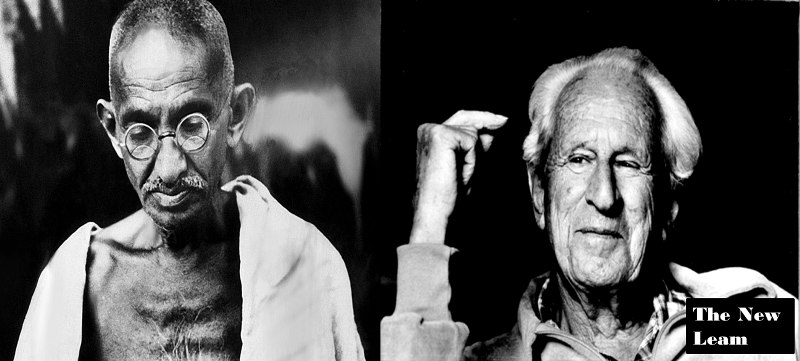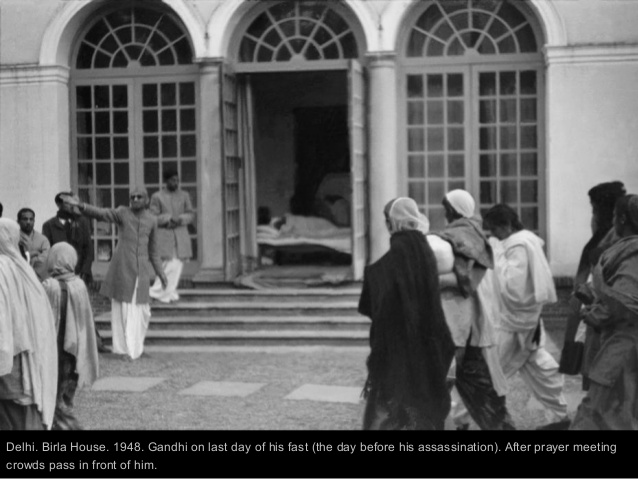In this experimental piece of writing, Professor Avijit Pathak brings Gandhi and Herbert Marcuse together; and this blend of Gandhi’s philosophy and the gem of critical theory helps us to see the possibility of a dialogue which is needed for a comprehensive undersatanding of our times – modernity, capitalism, social control and violence.
Avijit Pathak is a Professor of Sociology at JNU, New Delhi.

GANDHI: Nice to meet you, Mr.Marcuse. I am Mr. Mohandas Karamchand Gandhi.
MARCUSE: Who doesn’t know you, Mr.Gandhi? You sought to decolonize Indian consciousness. You dared to strive for non-violence as a mode of political resistance, even at a time when violence was all-pervading. You looked like a saint; but you were a revolutionary of some sort.
GANDHI: I know, Mr. Marcuse, there are multiple ways through which people look at me. For some, I am medieval, conservative and casteist. Some regard me as a dreamy idealist. And there are people who think that I am an environmentalist or some sort of ecofeminist critiquing the process of reckless development and hyper-masculine manipulation of nature. However, these are all labels–mere concepts or categories people use for their convenience. What is important is the quality of practice– how we live and relate to the world. Why don’t you tell something about you, Mr. Marcuse?
MARCUSE: Mr. Gandhi, you were truly charismatic; people loved you. You lived with them. You communicated with them. Possibly, you would see me as an intellectual–or an academic radical popular among the revolutionary youth and university scholars. I loved Hegel, Marx and Freud. I belonged to the Frankfurt School of critical thinking that evolved at a crucial juncture of European history. I wrote a series of books and tried to understand capitalism and new forms of social control ,and technology and violence.
GANDHI: You are a great scholar, Mr. Marcuse. I am rather simple–not a very learned man. Well, I loved Ruskin and Tolstoy, Thoreau and Emmerson; I engaged with the Bhagavadgita, Sermon on the Mount and other spiritual texts; and through constant experiments with life I evolved and learned. I failed repeatedly. Yet, I didn’t give up. Anyway, I would like to know from you–the way you looked at technology, capitalism and violence.
MARCUSE: What are you saying, Mr.Gandhi? You are too humble. With your life, political mobilization and simple words you gave us deep insights into colonialism, modernity and violence. I know that there are people–including many radicals–who did not feel easy with you–particularly, your moral/religious self, or your faith in the capacity of the oppressors–if sufficiently persuaded by an ethical mode of resistance– to change and alter their life-practices. Even, because of my own reading of sexuality, sublimation and repression, I do not agree with your extremely puritan notion of body and sexuality. However, despite these differences, I tend to believe that there is immense potential in your simple booklet Hind Swaraj.
GANDHI: Yes, Mr. Marcuse, I saw ‘brute force’ in the practice of colonial modernity. In the modernist urge for endless development, I saw greed, desire and perpetual restlessness causing aggression and violence. And I celebrated ‘soul force’–our sattwic qualities, austerity, voluntary poverty and ability to live in harmony with the local community and the ecosystem. For me, ahimsa as a mode of life and political protest (you can call it satyagraha) emanates from the soul force. The future of our civilization, I believe, lies in the soul force–not in the brute power of mere material prosperity and technological spectacle.
MARCUSE: Truly remarkable insights, Mr. Gandhi. You know I wrote a book entitled One Dimensional Man. Yes, my language was different. Simplicity was your strength; but then, because of the intellectual tradition I belonged to, I could not become so lyrical in my communication. I admit that I could not avoid the use of Marxian and Freudian jargon’s in my text. I saw advanced capitalism in the West; I experienced the worst form of violence that European Enlightenment modernity led to–fascism, totalitarian thinking, technological violence and all-pervading war. Like you, I too critiqued this aspect of modernity. You call it ‘brute force’. I call it ‘instrumental rationality’. Its inherent principle is domination. It controls, manipulates and conquers nature for selfish interests and domination. And it is used to control even the human spirit; our relationships seem to have lost the ecstasy of unconditional humanity; everything is measured, quantified and commodified for instrumental interests.
GANDHI: Carry on, Mr. Marcuse. I like to know more from you. You speak of technology and instrumental rationality. However, these days everybody worships technology. How do you explain?
MARCUSE: True. And that is precisely my point. Modern capitalism seduces and controls people through a mix of market rationality and technological packaging. Hence, there are ‘false needs’; these days we are continually seduced to buy latest gadgets, latest devices and all sorts of trendy/fashionable products. These are not our ‘true needs’. These needs have been created by the market. And the market sanctifies it as a symbol of ‘good living.’ In a way, we try to find our ‘souls’ in the ‘products’ that we buy and consume. And this culture of consumption is all-pervading ; it is excedingly difficult to come out of it. In advanced capitalism even the ‘working class’ has lost its revolutionary potential; these days the steno of the corporate boss seeks to use the same brand of lipstick that the wife of her boss uses, and feels that it is a democratic society. This is waht I regard as ‘one dimensional tinking’. There is no protest. Everyone tries to become like others. Hence this democracy is essentially a form of domination–not through military power, but through the seductive charm of the market.
GANDHI: Great, Mr. Marcuse. I have begun to understand what you are saying. I too believe that these ‘false needs’ have colonized us. In Hind Swaraj, I tried to see this intoxication with desire–desire for more and more–as a source of psychic restlessness causing violence and disruption of man-nature relationship. Some think that I am against technology. This is not really true. Mr. Marcuse, you saw more advanced technology; you know more about it. From my limited understanding I tend to think that if machinery becomes gigantic, and replaces human agency and creativity, it can prove to be disastrous. What do you think about it?
MARCUSE: I do not misunderstand you, Mr. Gandhi. Even some people think that I am anti-science/anti-technology. The fact is that I am against the instrumental manifestation of science and technology. And one must speak against it. I do believe that these days technology is diminishing human creativity. Technology has become overwhelmingly powerful over our lives. Even though we talk about democracy and freedom, the fact is that a new form of social control has emerged. You can visit a mall. There are hundred shades of a particular brand of lipstick. Apparently, the market gives you the freedom to choose the shade you like as a consumer. But is freedom so shallow? Is there a freedom of living without any of these needs that the market with its culture industry is constantly bombarding on us?
GANDHI: Yes, I agree with you. Tell us something more about your friends and colleagues.
MARCUSE: I am sure you would love to read my colleague Erich Fromm’s beautiful book To Have or To Be. Like you, he too critiqued the urge to possess, accumulate, control and have everything–property, relationships, food, entertainment, sexuality. He loathes this ‘having’ mode of existence. And like you he celebrates ‘being’ mode of existence–a nuanced art of living that finds inner fulfilment in natural/simple things of life. You would regard it as ‘soul force’. And then, my another colleague Theodor Adorno wrote a powerful essay on ‘culture industry as mass deception’. He tells us how in modern times culture industry–with mass media, television soap operas, sports carnivals, glossy ads, film and musuc industry–shapes our thinking, choices and behaviour. When culture loses its liberatarian potential and becomes merely a manufactured product for mass consumption, it can crate a condition conducive to the growth of the ‘authoritarian personality’.
GANDHI: It is interesting. Even in contemporary India we see the same danger. Sometimes I feel that the fancy slogan of ‘development’ , widespread consumerism and manipulative use of television channels and social media are creating a similar situation in India that your colleague Adorno saw during the rise of Hitler. We all have to work together to create a new awakening.
MARCUSE: Yes. I know it is difficult. But then, Mr.Gandhi, you were a great organizer, a truly remarkable communicator. When I see you I find hope. We will continue to meet.













